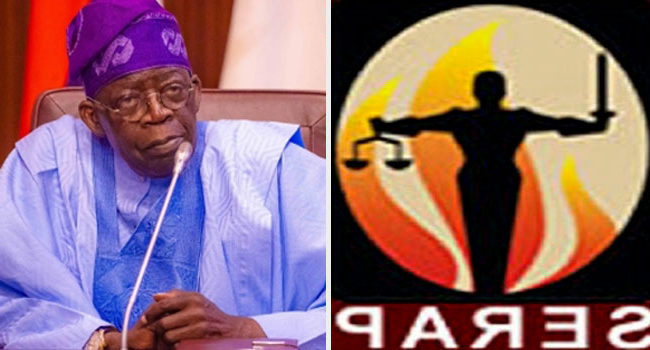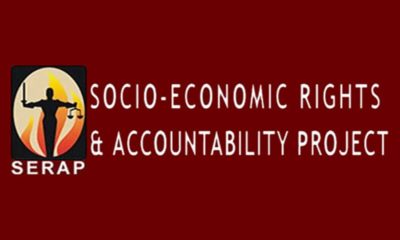Business
SERAP, BudgIT, 136 Nigerians Ask Court To Order Tinubu To Stop Cybersecurity Levy

The Socio-Economic Rights and Accountability Project (SERAP), BudgIT and 136 concerned Nigerians have filed a lawsuit against the Central Bank of Nigeria (CBN) “over its failure to withdraw the patently unlawful ‘Circular’ directing all banks and other financial institutions to deduct from customers’ account a ‘cybersecurity levy’.”
Recall that the CBN had last week directed banks to implement a levy of 0.5% (0.005) equivalent to a half percent of all electronic transactions, and to remit the levy to the ‘national cybersecurity fund.’ The CBN relied on the Cybercrime Act 2015 [as amended]. The directive is to be implemented by Monday, May 20, 2024.
In the suit number FHC/L/CS/822/2024 filed last Friday at the Federal High Court, Lagos, the Plaintiffs are asking the court to determine “whether the CBN Circular dated 6th May 2024, directing financial institutions to deduct from customers’ accounts a cybersecurity levy is unlawful and therefore ultra vires the CBN.”
The Plaintiffs are also asking the court to determine “whether the CBN Circular dated 6th May 2024, directing financial institutions to deduct from customers’ accounts a cybersecurity levy and section 44(2)(a) of the Cybercrimes Act are not in breach of sections 14(2), 44(1) and 162(1) of the Nigerian Constitution 1999 [as amended], and therefore unconstitutional, null, and void.”
The Plaintiffs are asking the court for “a declaration that the CBN Circular dated 6th May 2024 directing all banks and other financial institutions to deduct from customers’ accounts a cybersecurity levy is contrary to the provisions of the Cybercrimes Act and ultra vires the CBN, and therefore is illegal null and void.”
The Plaintiffs are seeking “an order of interim injunction restraining the CBN, its office, agents, privies, assigns, or any other persons acting on its instructions from enforcing the Circular dated 6th May 2024, pending the hearing and determination of the motion on notice filed contemporaneously in this suit.”
The suit filed on behalf of the Plaintiffs by their lawyer Ebun-Olu Adegboruwa, SAN, read in part: “The CBN Circular is unlawful and an outright violation of the provisions of the Nigerian Constitution and the country’s international obligations.
“Unless the reliefs sought are granted, the CBN will enforce its Circular directing banks to deduct from customers’ accounts a cybersecurity levy. Millions of Nigerians with active bank accounts would suffer irreparable damage from the unlawful deduction of cybersecurity levies from their accounts.
“The provisions of the Cybercrimes Act on payment of cybersecurity levy strictly apply only to businesses listed in the Second Schedule to the Act. These provisions make no reference to bank customers, contrary to the CBN Circular to all banks and other financial institutions.
“The Nigerian government has a legal responsibility to ensure the security and welfare of the people, as provided for under section 14(2)(b) of the Nigerian Constitution and human rights treaties to which Nigeria is a state party.
“The CBN Circular is also a blatant violation of Nigerians’ human rights including the right to property guaranteed under section 44 of the Nigerian Constitution and article 14 of the African Charter on Human and Peoples’ Rights to which Nigeria is a state party.
“We urge the Honourable (Court) to grant the reliefs sought in the public interest and the interest of justice as well as to prevent arbitrariness and ensure the rule of law in the country.
“Any deduction of cybersecurity levy from Nigerians’ accounts would be contrary to the provisions of section 44(2)(a) of the Cybercrimes Act 2015 as amended by the Cybercrimes Prohibition, Prevention etc) (Amendment) Act 2024 and ultra vires the CBN, and therefore illegal, null and void.
“Section 162 (1) of the Nigerian Constitution provides that all revenues collected by or on behalf of the Government of the Federation are mandatorily required to be paid into the Federation Account save the revenue excepted by the provisions of the section.
“The National Cybersecurity Fund established by section 44(1) of the Cybercrimes Act 2015 [as amended] into which it is required to be paid the levy of 0.5% chargeable on all electronic transactions instead of the Federation Account is unconstitutional, null, and void.
“The CBN Circular is a breach and misinterpretation of Sections 44(2)(a) and 58 of the Cybercrimes Act [as amended], in that it purports to incorporate customers of the bank (neither defined by the Act nor designated by the CBN as financial institutions) as those to pay the cybersecurity levy.
“The Plaintiffs are customers of commercial banks in Nigeria with accounts domiciled with many commercial banks in Nigeria. The CBN is the statutory agency charged with the overall control and administration of the monetary and financial sector policies of the Federal Government.
“The Plaintiffs are included in the statistics of Nigerians with active bank accounts as the Plaintiffs are owners of accounts in different Banks and other financial institutions.
“As of 30 April 2024, commercial banks in Nigeria already charge exorbitant fees for electronic transactions, including Electronic Transfer Charges at N53.75 on any amount above N10,000, Stamp Duty of N50 on every transaction and Account Maintenance Charge deducted per month.”
The Plaintiffs are therefore asking the court for the following reliefs:
“A DECLARATION that the Circular issued by the CBN and dated 6th May 2024 directing all banks and other financial institutions to deduct from customers’ accounts cybersecurity levy is manifestly misleading, extorting and a breach and misinterpretation of the provisions of Section 44, 58 and Second Schedule of the Cybercrimes (Prohibition, Prevention, ETC) (Amendment) Act 2024 and ultra vires the CBN, and therefore is illegal, null and void.
“A DECLARATION that the Circular issued by the CBN and dated 6th May 2024 directing all banks and other financial institutions to deduct from customers’ accounts cybersecurity levy and section 44(2)(a) of the Cybercrimes Act are inconsistent with, and a breach of the provisions of Section 14(2), 44 (1) 162 of the Nigerian Constitution 1999 [as amended] and therefore unconstitutional, null and void.
“AN ORDER setting aside the Circular issued by the CBN and dated 6th May 2024 directing all banks and other financial institutions to deduct from customers’ accounts cybersecurity levy, for being misleading, extorting and a breach of the provisions of Section 44, 58 and Second Schedule of the Cybercrimes (Prohibition, Prevention, ETC) (Amendment) Act 2024.
“AN ORDER setting aside the Circular issued by the CBN and dated 6th May 2024 directing all banks and other financial institutions to deduct from customers’ accounts cybersecurity levy and section 44(2)(a) of the Cybercrimes Act, for being inconsistent with, and a breach of the provisions of Section 14(2), 44 (1) and 162 of the Nigerian Constitution 1999 [as amended] and therefore unconstitutional, null and void.
“AN ORDER restraining the Central Bank of Nigeria, including its agents, assigns, privies and or representatives or such other persons acting on its behalf, from enforcing the Circular issued by the CBN and dated 6th May 2024 against all banks and other financial institutions and their customers.
“ANY ORDER(S) that the Honorable Court may deem fit to make in the circumstance of this suit.”
No date has been fixed for the hearing of the suit.
Business
ADF Flags Off N16Bn 2025 National Food Intervention Programme

Over one million Nigerians nationwide will receive a 10kg bag of rice each, with the Aliko Dangote Foundation (ADF) distributing the staple food as part of the 2025 Annual National Food Intervention Project.
The initiative, which commenced on Thursday would is estimated at a whooping cost of N16 billion.
During the flag-off of the nationwide distribution in Kano, Chairman of the Foundation, Alh Aliko Dangote, said the distribution of one million bags of 10kg rice to the poor and vulnerable Nigerians in the 774 Local Government Areas (LGA) in Nigeria was in line with the core values of his businesses and the ADF.
Dangote, who was represented by his daughter, Mariam Aliko Dangote said, “This annual initiative, which embodies compassion, solidarity, and shared responsibility, is part of our response to the current economic challenges facing our nation. It reflects our commitment to supporting our communities in line with our core values.”
ALSO READ: BREAKING: Rivers Chief Judge Under Probe For Alleged Age Falsification
He highlighted that the Foundation was kicking off the distribution in Kano State, after which it will proceed to other states, assuring that all arrangements are in place to ensure the food reaches those who need it most in all the LGAs of Nigeria.
Dangote, reputed to be Africa’s wealthiest person opined that food remains a basic human necessity, and this is why the ADF adopted the practice of embarking on a food distribution programme across Nigeria.
“We are collaborating with state governments to ensure that the food reaches the most vulnerable individuals in each state,” he added.
According to Dangote the ADF focuses on improving the living conditions of Nigerians through support for projects which tackle hunger and water supply problems, strengthen the quality and scope of health and education, and promote economic empowerment at the community level.
“Your excellency, I believe that today’s event will help in tackling hunger and helping the most vulnerable people in breaking their fast. We are playing our role in enhancing the living conditions of our people. I urge other industrialists and firms to lend a helping hand in combating hunger through programmes and initiatives that will place food on the tables of vulnerable Nigerians. This job should not be left to the government alone, rather we need a public private partnership that will help us in fighting the scourge.
“I commend the government at all levels for their efforts at addressing the food crisis. I am certain that with time, we shall overcome these challenges, therefore let us support the government to achieve its target of a better life for Nigerians, “he said.
On his part, Kano State Governor, Abba K. Yusuf, who flagged off the National Food Intervention Programme commended the good gesture and said the intervention reflects the unwavering commitment of Alh Dangote in addressing poverty and hunger in Nigeria.
The Governor, who was represented by his Deputy, Comrade Aminu Abdulsalam Gworzo said 120,000 bags of 10kg rice will be distributed across the 44 Local Government Areas of the state.
He described Alh Dangote as humane, adding that: “A similar event took place last year where he personally oversaw the distribution of food stuff to the poor in this very arena.”
To ensure transparency in the distribution process, he said the state government has set up a committee comprising of relevant ministries, CSOs, religious leaders, departments and agencies, local authorities, the Hisbah Board and security agencies.
Managing Director and Chief Executive Officer of the Aliko Dangote Foundation, Zouera Youssoufou, said the Annual National Food Intervention Project is a way of giving back, and supporting governments in fighting poverty and hunger in Nigeria.
She said that Alh Dangote is passionate about philanthropy and committed to ensuring that hunger is wiped out or reduced to the minimum in Nigeria.
“We are going to other states to distribute the products, but we’ve just flagged off in Kano,” she told newsmen on the sideline of the Kano Government House, venue of the flag off.
The Deputy Commander-General of Hisbah Board in Kano, Dr. Mujahid Aminudeen, thanked the ADF for the initiative, urging more Nigerians to emulate Alh Dangote in the humanitarian cause.
He said the Hisbah Board will ensure that the products reach the targeted beneficiaries.
One of the beneficiaries, Ibrahim Ahmed, speaking on behalf of others thanked Alh Dangote for his large heart saying the gift would go a long way in reducing food pressures on them especially during the Ramadan while also praying God to continue to help him in his businesses.
Recall that the ADF has been at the forefront of tackling and ameliorating the impact of natural disasters and health challenges in Nigeria and the rest of the world.
The ADF donated N153million to boost Nigeria’s fight against Ebola Virus Disease in 2014, $3million to the African Union (AU) to help combat the scourge, and N66.66 million to install thermal scanning systems and cameras at Nigeria’s 4 international airports.
During the COVID-19 pandemic, we donated N2billion to the CACOVID Fund, a Private Sector task force in partnership with the Federal Government, the Nigeria Centre for Disease Control (NCDC) and the World Health Organisation (WHO) with the sole aim of combating Coronavirus (COVID-19) in Nigeria.
In support for education, we donated a N1.2bn modern business school edifice to the Bayero University, Kano, a fully equipped 2,160-bed capacity hostel complex to the Ahmadu Bello University, Zaria and a N300 million building to University of Ibadan Business School.
Beyond the shores of Nigeria, the ADF has also recorded milestones with a donation of $1million, to lift victims of two earthquakes that devastated Nepal.
Business
Lawmakers Call For Immediate Reversal Of ATM Fee Increase

The Central Bank of Nigeria (CBN) is under pressure to suspend its recently introduced increase in Automated Teller Machine (ATM) transaction charges due to the country’s worsening economic conditions.
During Tuesday’s plenary session, Marcus Onobun, a lawmaker representing Esan Central/Esan West/Igueben Federal Constituency in Edo State, raised concerns over the policy through a motion of urgent public importance.
He noted that the CBN’s directive not only increases withdrawal fees but also removes free ATM transactions for customers using other banks’ machines, adding to the financial strain on Nigerians.
SEE ALSO: Direct CBN To Suspend ATM Fee Hike Pending Court Verdict, SERAP Tells Tinubu
According to the new regulations, customers withdrawing from their own bank’s ATMs will still enjoy free withdrawals.
However, those using other banks’ ATMs will now be charged N100 for withdrawals of N20,000 within a bank’s premises. At off-site ATMs, such as those in shopping malls or markets, the charge remains N100, but with an added N500 surcharge.
Onobun, a member of the Peoples Democratic Party (PDP), argued that Nigerians are already struggling with economic difficulties, including high inflation, rising fuel costs, increased electricity tariffs, and multiple banking fees.
He warned that the additional charges could further discourage financial inclusion, particularly among low-income earners, contradicting the CBN’s own agenda.
“The banking sector continues to record significant profits, yet customers are being burdened with more charges without any improvement in service delivery or infrastructure. This is unfair and unacceptable,” he stated.
Following his motion, Speaker Tajudeen Abbas put the matter to a voice vote, and lawmakers overwhelmingly supported it.
As a result, the House of Representatives called on the CBN to immediately halt the implementation of the policy until further consultations are held with relevant banking and finance committees.
Business
NNPC Ltd Clarifies Naira-Crude Contract With Dangote Refinery

The Nigerian National Petroleum Company Limited (NNPC Ltd) is already emplacing an new naira for crude contract with the Dangote Petroleum Refinery and Petrochemicals, because the initial contract was for six months which expired in March 2025.
This clarification was made in a statement in Abuja by the Chief Corporate Communications Officer, NNPC Ltd, Olufemi Soneye on Monday.
ALSO READ: Naira-For-Crude Policy Still-In-Force – Chairman, Technical Sub-Committee
According to Soneye, the NNPC Limited has noted recent reports circulating on social media regarding the alleged unilateral termination of the crude oil sales agreement in Naira between NNPC Ltd. and Dangote Refinery.
To clarify, the contract for the sale of crude oil in Naira was structured as a six-month agreement, subject to availability, and expires at the end of March 2025. Discussions are currently ongoing towards emplacing a new contract.
Under this arrangement, NNPC Ltd. has made over 48 million barrels of crude oil available to Dangote Refinery since October 2024. In aggregate, NNPC Ltd. has made over 84 million barrels of crude oil available to the Refinery since its commencement of operations in 2023.
NNPC Limited remains committed to supplying crude oil for local refining based on mutually agreed terms and conditions.
















